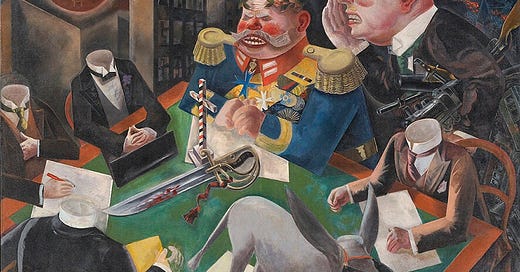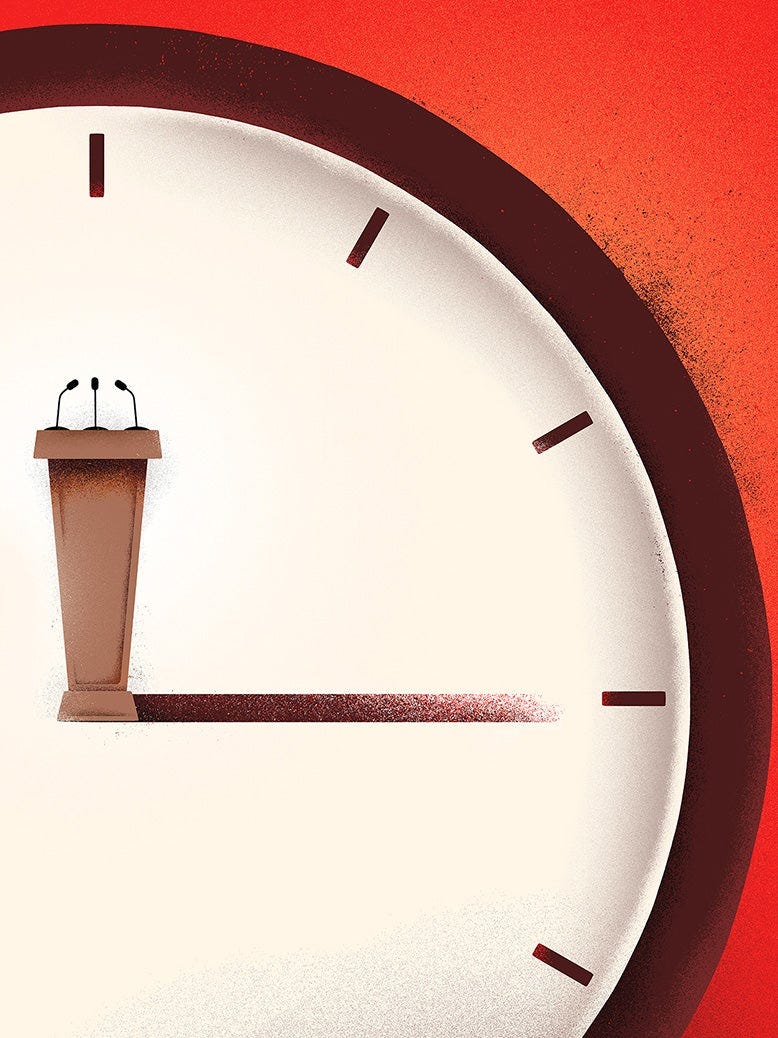The Salvo, vol. 1: Germany and its discontents
Drinking in Burma, and new perspectives on the sick man of Europe.
Welcome to the inaugural edition of The Salvo, your weekly ideas newsletter from the New Statesman. This week, we’re talking Germany.
The appointment of Thomas Meaney as the editor of Granta magazine last year was an astute choice for a title lost from view. An American writer whose interests range across the humanities and the hemispheres, I first met Tom in 2016. I was living in Myanmar – Aung Suu Kyi was free from house arrest and the country was exchanging isolated dictatorship for faux democratic start-up – and he wrote to say that he was passing through Yangon with his family while on a research trip and did I want to meet?
We met at the Alamanda Inn, a teak guesthouse with a questionable French restaurant surrounded by jungle. In this outre corner of the old empire, we chatted about many things – a biography of General Ne Win which Tom had just started reading, another of Leszek Kolakowski which I dreamed of writing, the difficulty of getting to Sittwe (Rakhine state was targeting the Rohingya population there at the time), and, this being Burma, Orwell – while trying to tame the evening heat with refills of junta-funded Myanmar Beer. Tom has reminded me that there were two older men sitting at a nearby table discussing an issue of the London Review of Books which rested between them, a conversation we for some reason declined to enter.
Meaney has lived in Germany since 2015, with tours of duty at the Einstein Forum, the Max Planck Institute, and Humboldt University. With a command of literature and nonfiction, he’ll no doubt breathe fresh life into Granta, a storied title but one perhaps deserving of more influence beyond Holland Park. This is probably unfair and reflects the parochialism of my own reading. But the only time I can really remember being consciously aware of the title’s existence before now was in 2019 at a Granta-sponsored event at King’s College, London, on ‘The Idea of Europe’, after which the critic Leo Robson, New Left Review’s Simon Hammond and I took Perry Anderson to an ersatz Viennese café in Holborn where Perry, who famously “detests pubs”, drank cocktails through a straw – a surreal setting for learning about the conjuncture.
Given his whereabouts, it was hardly surprising that the first issue of Meaney’s tenure is titled ‘Deutschland’, a scrupulous, 328-page enchiridion on, as he writes in his introduction, “the most economically important country on the continent” but one which now “suffers from both a lack of literary ambition and exposure”. It’s an essential read for understanding modern Germany and should be celebrated by anyone who yearns for great writing and a busier magazine scene in London (in a future edition of The Salvo, I will try and take up the question of ‘why is there no Brooklyn in Britain?’).
Whatever the reasons for Germany’s straitened cultural life, the country also suffers from a lack of redeeming features right now. Its economy is stuck in recession and the hard right Alternative for Germany (AfD) is ascendant, while the ailing political establishment faces a second insurgent force in Sahra Wagenknecht’s independent party, the Sahra Wagenknech Alliance – for Reason and Justice (BSW). Unique political compounds are forming and strange social figures emerging. In the NS at the end of last year, Oliver Nachtwey and Carolin Amlinger sketched this “new authoritarian personality” stalking the Federal Republic, a dark by-product of late modernity who demands freedom from the state and from the judgement of others; a kind of libertarian hyper-nimby. I think a similar creature has emerged in Britain.
Germany has also become an even more disciplined supplicant of the US, as Washington grooms Berlin to be its lead proxy in Ukraine – a brutal war of attrition that has triggered a refugee crisis which many Germans, especially in the deindustrialising zones of the east, say is aggravating the economic downturn. As Wolfgang Streeck argues for us this week, assuming leadership in the west’s war against Russia “would be near to a suicide mission” for Germany.
And since 7 October, the cultural authorities have reprimanded artists, activists, writers, and scholars who have shown sympathy toward the Palestinians. Many of those whose talks have been cancelled, prizes postponed, and academic positions rescinded – Candice Breitz, Deborah Feldman, Masha Gessen, Eyal Weizman – are Jewish. There have been similar cancellations here in the UK: most recently, on 6 February, the Barbican decided to withdraw from hosting the LRB Winter Lecture series when it discovered that the Indian writer Pankaj Mishra was due to give one of the talks on ‘The Shoah After Gaza’.
Writing on the Gessen affair for the NS, the Potsdam-based philosopher Susan Neiman said that the attempt to withdraw the award of the Hannah Arendt prize from the Russian-American journalist, after Gessen compared Gaza to Nazi-built ghettos in eastern Europe, will remain a “stain” on German public culture. “Germany prefers to remember Jews as victims,” Neiman went on, “rather than as the bold and brave champions of universal human rights we have sometimes been. It’s a standpoint that not only reveals an ignorance of Arendt; it shows how little the country still knows about Jews”.
The attempt by the German state to suppress public debate about the government’s support for Israel and its war on the Palestinians should not be dismissed lightly. When I spoke to him in January, Streeck said that it “will do lasting damage to Germany as a liberal democracy. For example, there is now an entire generation of young journalists and social scientists learning that if they want to have a career, they must learn to pretend not to see something everyone else sees, and not to talk about it for staatsraison”.
There’s decreasing evidence, then, that “Germans do it better” or, as Neiman argued in her 2019 book Learning from the Germans, that we have much learn from them. Neiman herself wrote in the New York Review of Books last year that “Germany’s historical reckoning has gone haywire”.
Postwar German history has experienced similar moments when the country was rocked by state overreach, tabloid sensationalism, and heightened atmospherics. Quinn Slobodian recently reminded NS readers that in the 1970s – Germany’s “years of lead” – the government responded to a spate of Red Army Faction bombings and kidnappings by deporting 150 Arab residents, deploying novel forms of surveillance and stop and search protocols, raiding left-wing bookshops, and censoring and outlawing left-wing publications.
“It is hard not to see those years as having returned,” Slobodian wrote. “But this time it’s even worse. In the 1970s there was no equivalent of the AfD, a party founded by ordoliberal economists in opposition to Angela Merkel’s policy in the eurozone crisis which now makes Islamophobia and opposition to non-white immigration its primary platform”.
Indeed, in his first piece for the NS, the scholar Adrian Daub shows in a brilliant and sweeping essay that not only is the AfD ascendant in the polls but its views and phobias – on immigration, culture wars, net zero and identity politics – have spread and are now openly accommodated throughout Germany’s political class. The story of Germany over the last few months has been that of a country disoriented and unsure of its place in the world, with consequences that will reverberate across Europe.
Readings from the NS
“The devil is in the historical detail. The slave labour system Debreczeni was subject to was the product of an innovative public-private initiative.” Lyndsey Stonebridge on a rediscovered memoir from an Auschwitz survivor which offers lessons for our own reckonings with the Holocaust.
“The West is facing the consequences of its own creation: the principles and institutions of which it once envisioned itself as the sole arbiter turned back on itself.” Lily Lynch writes on end of humanitarianism in the wake of Gaza and South Africa’s case against Israel at the ICJ.
Oliver Eagleton reviews Jonathan White’s In the Long Run and considers the clashing political conceptions of futurity and the pace of democracy at a time of accelerating crisis.
My colleague Anna Leszkiewicz proves once more that she’s one of the best critics in the business with this stellar review of Shelia Heti’s Alphabetical Diaries.
Reading and listening elsewhere
‘Deutschland’, Granta, Issue 165: Autumn 2023
‘The German Question’, The Dig, 31 January 2024
The king of leftist podcasts, and one that often makes the average length of a Wagner opera seem fleeting, the latest episode of The Dig goes long on German memory politics.
Pankaj Mishra, ‘Memory Failure: Germany’s commitment to Israel’, London Review of Books, Vol. 46, No. 1, 4 January 2024.
“Some German words are so long,” wrote Mark Twain, “that they have a perspective.” They are not even words, he said, but more like “alphabetical processions”. Germany’s modern history is dark and complex enough to have produced one of these “grand mountain ranges” that stretches across the page: Vergangenheitsaufarbeitung, or “working-off-the-past”. Mishra’s essay is the best I’ve read so far on why Germany is failing to reckon with its past.
Enjoy, and see you next week.
— Gavin.









I'm unsure if your esteemed writer has the actual German experience to confirm his friend's opinions. I personally experienced an obsessive rule-bound rigidity in the 80's-90's which doesn't feature here, but certainly German hospitals did everything they could to help us.